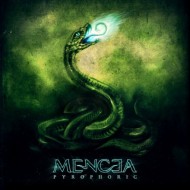 If this album really is pyrophoric it could, as I understand it, spontaneously ignite, so I’d better be pretty sharpish writing this review, hadn’t I? Straight down to business then. Greece’s Mencea are the death metal tipping point where complex progression slams hard into fist-flailing groove.
If this album really is pyrophoric it could, as I understand it, spontaneously ignite, so I’d better be pretty sharpish writing this review, hadn’t I? Straight down to business then. Greece’s Mencea are the death metal tipping point where complex progression slams hard into fist-flailing groove. Since their formation in 2008 they’ve been diligently marrying Meshuggah’s mathematical nous to Gojira’s bludgeoning walls of noise. Their debut, Dark Matter, Energy Noir, gave us our first taste of the robust, bass-loaded power that these Athenians were capable of, and offered plenty of food for thought at a time when bands of this ilk were a little thinner on the ground. Now, with this sophomore effort having to go the extra mile to impress, they’ve decided to produce, mix and master the album themselves, opening up the mix to allow for a heightened sense of melodic drama. So, with Pyrophoric offering us a new vocalist and drummer, as well as much wider access to their full range of moods, have they maintained enough of their raw grunt to really stick it to the man?
Well, with the opening arpeggio of “Phosphorous” walking smack into Vlasis Ziouvas’ barking, guttural vocal and a cascade of bottom-end chugging, they prove well capable of the feat. Behind the picture of rage they are painting here, there is plenty of filling and framing taking place as sweeping keyboards build up the layers to paint an expansive portrait of light and shade.
“CCC” may drag their Gojira-worshipping side to the fore as Bertrand Rothen lays down a pummelling rhythm, but it soon gives way to a brittle, yet beauteous Textures-esque soundscape. Following up, “Elders” picks up the baton and runs further with it, digging harder into the groove to hit you with aural images of what can only be described as an army of faceless robots marching into some futuristic machine-on-man battle.
Mencea manage to jumble their component parts to create real m-e-n-a-c-e by injecting darkness into much of what they do as they go sniffing around a black metal vibe. It lurks deep down in so much of the album, forever threatening to grind any standout hooks into dark smears. It’s there in “Hounds” yanking down hard on the track’s jangling, industrial electronic touches, and it’s there again in the wild twists of “Beheading”. Here amidst unsettling swarms of guitars, which thread their way through a plethora of disparate sections into the title-track’s swagger and kicker of rolling toms and sibilant guitar, the band hit a late creative peak. Closer “The Dead”, with its vein-popping Cavalera-esque bludgeoning, is a feast fit for a king.
With 8 tracks skipping by in 36 minutes, the album is a couple of songs shy of being the full enchilada, but it still packs enough of a meaty kick to give your brain matter a good shaking for a while. Consider this: the other feature of a pyrophoric substance is that it can produce sparks when struck and considering the smothering, warm production on show here, at no time, do Mencea quite manage enough of those sparks to truly set the world on fire. Don’t get me wrong, this is one spicy meatball but, once they have properly roughed up their edges to find the kind of ear-scraping menagerie of sound that some of their peers have managed, they’ll truly be a force to be reckoned with.
Also online @ Ave Noctum = http://www.avenoctum.com/2012/03/mencea-pyrophoric-indie-recordings/





